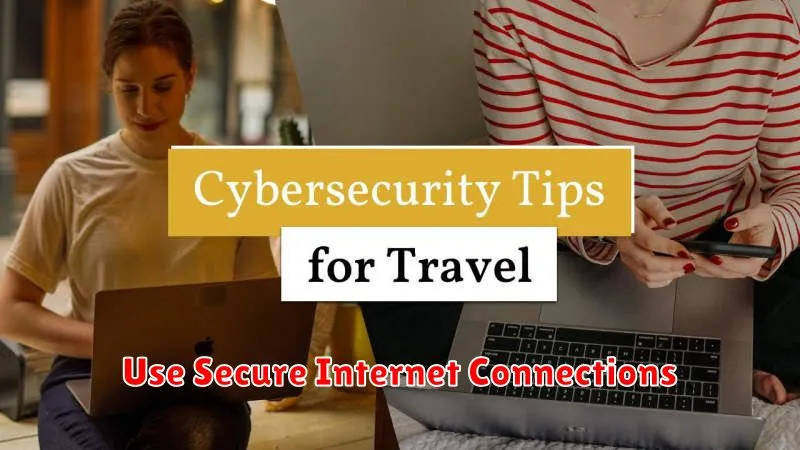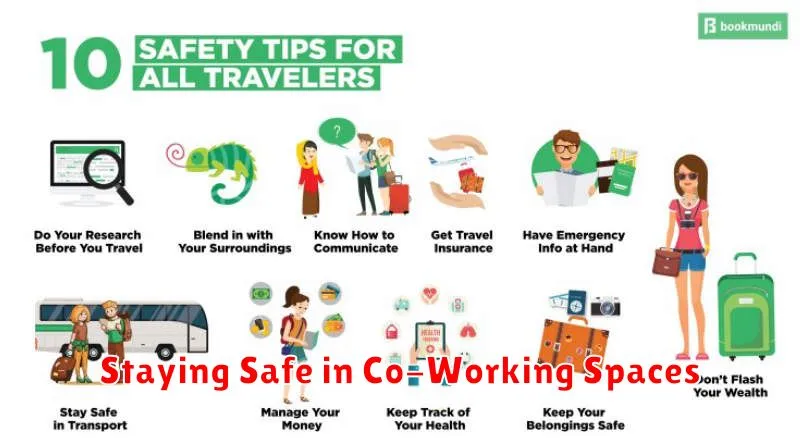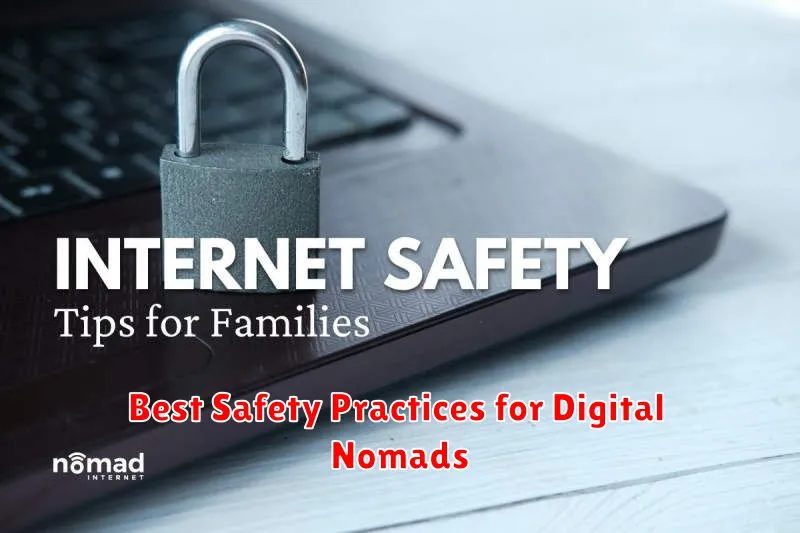The allure of a location-independent lifestyle, fueled by the rise of remote work, draws many to embrace the digital nomad life. However, this freedom comes with its own set of challenges, particularly concerning digital security and personal safety. Best safety practices are paramount for digital nomads to safeguard sensitive information, protect devices, and ensure their well-being while traversing the globe. This article will delve into essential safety tips for digital nomads, encompassing everything from robust password management and secure Wi-Fi usage to physical security measures and travel insurance considerations. Understanding these crucial safety practices will empower digital nomads to confidently navigate the exciting yet complex world of remote work and travel.
Whether you’re a seasoned digital nomad or just beginning to plan your location-independent journey, prioritizing safety is non-negotiable. From protecting yourself against cyber threats like phishing scams and data breaches to mitigating risks associated with unfamiliar environments, adopting proactive safety measures is key. This guide will provide practical safety tips for digital nomads, covering digital security best practices, essential travel security advice, and resources to help you stay informed and prepared. By implementing these best safety practices, digital nomads can minimize risks, maintain peace of mind, and fully enjoy the unique benefits of a location-independent lifestyle.
Challenges Digital Nomads Face
While the digital nomad lifestyle offers freedom and flexibility, it also presents unique challenges. Maintaining a stable internet connection is crucial for work, yet can be unpredictable in some locations. Finding reliable co-working spaces or cafes with sufficient bandwidth is a recurring concern.
Managing finances across different currencies and tax systems can be complex. Digital nomads must stay informed about visa requirements and local regulations, which can vary significantly between countries. Time zone differences can also make communication with clients or teams challenging, requiring flexibility and careful scheduling.
Loneliness and social isolation are potential downsides of constantly moving. Building a consistent support network can be difficult, requiring proactive efforts to connect with other nomads or locals.
Healthcare access also presents a hurdle. Securing reliable international health insurance and navigating different healthcare systems can be complicated and costly. Ensuring personal safety and security in unfamiliar environments is another important consideration. Digital nomads must be vigilant about protecting their belongings and personal information.
Use Secure Internet Connections

For digital nomads, using secure internet connections is paramount to protecting sensitive data. Avoid public Wi-Fi for tasks involving financial transactions or accessing personal accounts. These networks are often unsecured, making your data vulnerable to interception. Always opt for a Virtual Private Network (VPN). A VPN encrypts your internet traffic, shielding your online activity from prying eyes, even on public networks.
When choosing a VPN, prioritize reputable providers with strong encryption protocols. Look for features like a kill switch, which automatically disconnects your internet if the VPN connection drops, preventing data leaks. Consider using password managers to generate and securely store complex passwords for all your online accounts. This mitigates the risk of credential theft.
VPN and Data Encryption Tips
Protecting your data while working remotely is crucial. A Virtual Private Network (VPN) encrypts your internet traffic, shielding your online activity from prying eyes on public Wi-Fi. Always connect to a reputable VPN before accessing sensitive information.
Beyond a VPN, enable two-factor authentication (2FA) on all important accounts. This adds an extra layer of security, requiring a second verification method like a code from your phone.
Data encryption isn’t just for internet traffic. Encrypt your devices themselves. Most operating systems offer built-in encryption tools. Enabling this feature protects your data even if your device is lost or stolen.
Be mindful of phishing scams. These attempts to steal your information often arrive via email or text. Verify the sender before clicking any links or providing any personal data. Use strong, unique passwords for each account to minimize the impact of a potential breach.
Staying Safe in Co-Working Spaces

Co-working spaces offer a productive environment, but safety should remain a priority. Be mindful of your belongings. Don’t leave laptops, phones, or bags unattended. Consider using a lock for your laptop when stepping away, even briefly.
Physical security is also important. Be aware of the entry and exit points. Familiarize yourself with the co-working space’s security protocols, including emergency exits and procedures. If something seems amiss, report it to the staff immediately.
Data security is crucial. Avoid accessing sensitive information on the public Wi-Fi. Utilize a Virtual Private Network (VPN) for secure internet access. Be cautious of who is around you when entering passwords or discussing confidential information.
Avoid Oversharing on Social Media
While social media can be a great way to connect with others and document your travels, it’s crucial for digital nomads to be mindful of what they share. Oversharing can create safety risks.
Avoid posting real-time location updates. Sharing that you’re currently at a remote beach or hiking trail advertises that your home is unoccupied and vulnerable to theft. Delay posting about your location until after you’ve left.
Be cautious about sharing details of your travel itinerary, especially flight information and accommodation details. This information can be used by malicious individuals to track your movements. Keep your future plans general when posting publicly.
Think twice before sharing photos of valuables. Flaunting expensive electronics or jewelry can attract unwanted attention. Consider the message you’re sending and the potential risks involved.
Be selective with your connections. Don’t accept friend requests from strangers. Vet your online connections as you would in the physical world. Limit your personal information to trusted contacts.
Backup Important Files Daily
As a digital nomad, your data is your livelihood. Losing important files due to theft, hardware failure, or accidental deletion can be devastating. Regular backups are crucial to mitigate these risks.
Aim to back up daily. Consider the 3-2-1 backup strategy: 3 copies of your data on 2 different media types, with 1 copy offsite. This method ensures redundancy and protects against various failure scenarios.
Utilize a combination of backup methods. Cloud storage services offer automated backups and accessibility from anywhere. External hard drives provide a physical backup you control. Consider using both for comprehensive protection.
Critical files to back up include client projects, financial documents, passport scans, and any work-related materials. Automate your backups whenever possible to ensure consistency and avoid accidental omissions. Verify backups periodically by restoring a few files to confirm they are working correctly.
Legal Residency and Visa Rules
Maintaining legal residency status is crucial for digital nomads. Overstaying a visa can lead to fines, deportation, and difficulty obtaining visas in the future. Thoroughly research the visa requirements of your destination country before you arrive.
Many countries offer specific visa programs tailored to remote workers. These visas often have income requirements and other stipulations. Ensure you meet all the eligibility criteria and apply well in advance of your intended travel dates.
Keep meticulous records of your visa application, entry and exit stamps, and any other relevant documentation. Digital copies stored securely in the cloud can be invaluable if physical documents are lost or stolen.
If you’re unsure about any aspect of visa regulations, consult with an immigration lawyer or the relevant embassy or consulate. Professional advice can help you navigate complex legal frameworks and ensure you remain in compliance with local laws.

